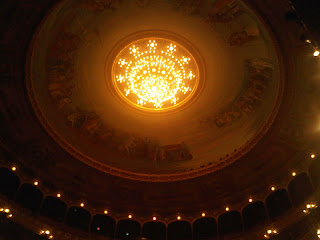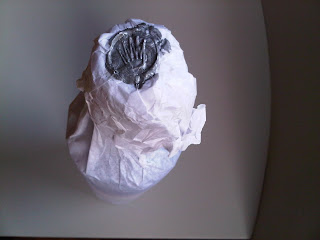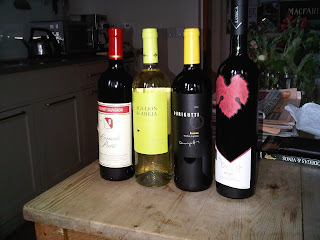 On the inside of the cupola of the Teatro Colon Buenos Aires (one of the 5 world’s greatest opera houses) is a pantheon of composers’ names not visible in the photo above but trust us, they are there):
On the inside of the cupola of the Teatro Colon Buenos Aires (one of the 5 world’s greatest opera houses) is a pantheon of composers’ names not visible in the photo above but trust us, they are there):
Gluck
Haydn
Mozart
Cherubini
Meyerbeer
Rossini
Bellini
Donizetti
Schumann
Chopin
Verdi
Berlioz
Bizet
Wagner
Gounod
As with all such lists it is amusing for future generations to see who has endured and who has been omitted. If Gluck, why not Handel?, if Schumann, why not Schubert? If Chopin why not Liszt?. Where are Bach, Beethoven, Weber, Brahms? The Russians (Tchaikovsky, Mussorgsky, Rimsky) are entirely absent.
With wine, it seems tastes change even more rapidly. On our recent return trip to Argentina we learned that as little as 10 years ago no one was interested in Malbec. Now it has become the Argentinean signature grape with a vengeance. Not only that but it has become synonymous with Mendoza, so as we know diversity has gone out of the window with interest seemingly restricted to comparing one Malbec from Mendoza with a great many others, all more or less in the same rather assertive style.
Winemakers and consumers alike might spare a thought for one name on the ceiling of their newly restored opera house – Meyerbeer. At the time when Wagner was a struggling young composer in Paris, Meyerbeer ruled the operatic world.
In a country where the second most planted red grape, the rather interesting Douce Noire (aka. Bonarda) is called the “Ugly Duckling,” where consumers are notoriously conservative and brand–orientated and apparently uninterested in diversity there seems at present little hope for much change until Malbec goes the way of Meyerbeer. Meanwhile there may be other varieties waiting in the wings. For example, take the case of Béquignol, a fascinating import from Bordeaux and South-West France which accounts for 0.94 of Red Wine production. This means that there are no less than 2,256 acres of Béquignol grown in Argentina which is more than Barbera (1,828), Torrontés Mendocino (as opposed to the more familiar Torrontes Riojano - 1,643), Riesling (271) and Viognier (1,848) according to the website www.winesofargentina.org.
No one in any of the wineshops we visited had ever heard of Béquignol, so we made contact with Nigel Tollerman who according to our research is a mainstay of the Argentinean wine scene in Buenos Aires. Starting at Sommelier School in Argentina before he had learned Spanish he has set up in his own business (0800-VINO)
and was (perhaps still is) the only wine merchant in Buenos Aires to have a temperature-controlled cellar. As he says, most of his competitors don’t know much about wine. We ourselves discovered some of them still think Bonarda is an Italian grape and Torrontes a Spanish one (Bonarda is French - Savoyard - and Torrontes is a native cross between Mission or Criolla Chica and Muscat of Alexandria and has nothing to do with the Torrontes of Galicia).
Nigel informed us that various wineries grow all kinds of experimental varieties but either sell the resulting bottles only at the cellar door, use them in blends or do not sell them at all. He added that the Argentinean consumer is very conservative and very brand-orientated. He was seemingly happy to tutor us in all aspects of Argentinean wine.
 Nigel is fantastically hardworking and has already built his business up to a commanding position, it seems. He spends two or three months in the UK every year and travels extensively throughout Argentina seeking out interesting wines from small producers. He was intriguing on the subject of Natural Wines saying because of the excellent dry growing conditions, often accompanied by healthy winds, Argentinean vines did not need much spraying and many vineyards were biological without even bothering to become so officially. On the subject of sulphur, he said that all wine contained naturally occurring sulphurs so even unsulphurated wines were not free of them.
Nigel is fantastically hardworking and has already built his business up to a commanding position, it seems. He spends two or three months in the UK every year and travels extensively throughout Argentina seeking out interesting wines from small producers. He was intriguing on the subject of Natural Wines saying because of the excellent dry growing conditions, often accompanied by healthy winds, Argentinean vines did not need much spraying and many vineyards were biological without even bothering to become so officially. On the subject of sulphur, he said that all wine contained naturally occurring sulphurs so even unsulphurated wines were not free of them.
Coming from the Sommelier side of the business, Nigel knew how to get the best out of us and at the same time give us his best. Asking us what we wanted to spend and what our interests were, we walked off with the following bottles – twice as many as intended but quite a bit cheaper than we had expected. He accomplished all of this while dealing with other customers on the telephone, beautifully and painstakingly wrapping our bottles first in tissue paper and then, unbidden in bubble wrap


Cabernet Sauvignon: Carmelo Patti 2003, Lujan de Cuyo, Mendoza, 14%
Malbec: Opalo 2008, Valle de Uco, 14% (“no usamos madera” – unwooded).
Bonarda: Durigutti 2008, Mendoza, 13.5% (“neither cold stabilised, filtered or fined”)
We look forward to these especially the Durigutti whose Malbec was the standout wine at a tasting organised by Anuva Wines – a very ‘gemütlich’ small-scale event which nonetheless managed to present 4 varieties in a flight of 5 wines and represent various regions as well.
For anyone wanting to make sense out of Argentinean wine though, Tollerman's the man. He will even ship to you anywhere in the world served by DHL if you like. www.0800-vino.com


No comments:
Post a Comment